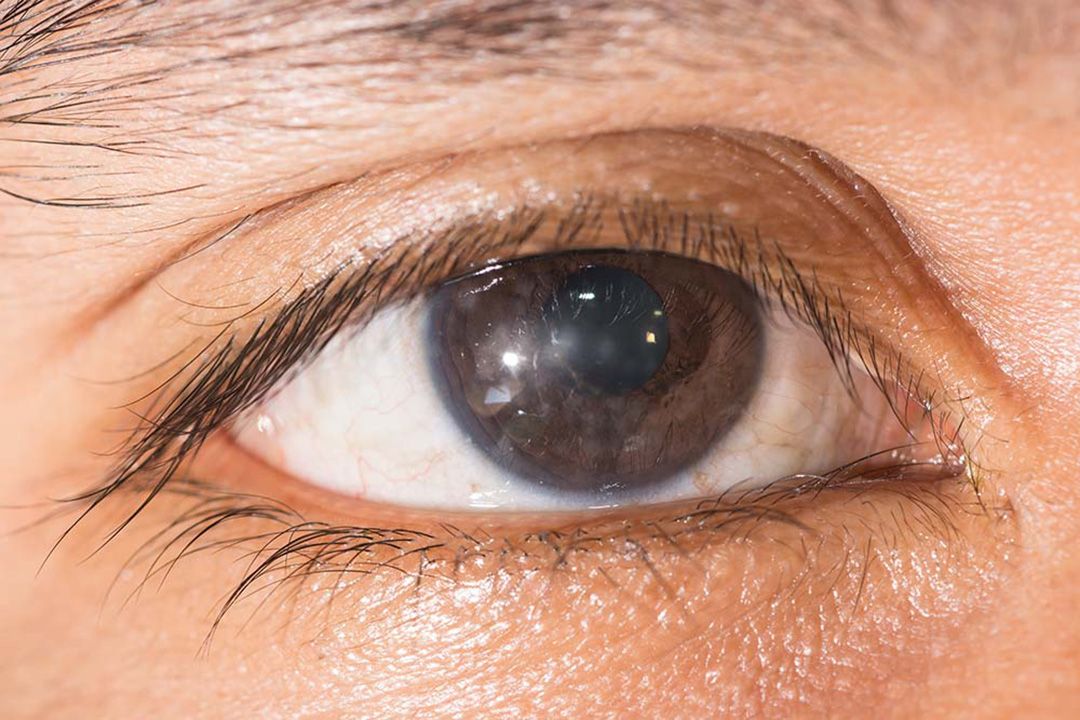Keratitis merupakan kondisi peradangan pada kornea yang tidak boleh disepelekan. Sebab, jika tidak segera ditangani, kondisi ini dapat mengganggu penglihatan secara permanen.
Gejalanya dapat muncul tiba-tiba, mulai dari mata merah yang mengganggu, sensasi nyeri, hingga penglihatan buram.
Oleh karena itu, penting untuk mengenali penyebab dan cara mengatasinya sejak dini agar komplikasi serius bisa dicegah. Jadi, mari simak informasi lengkapnya di bawah ini!
Apa Itu Keratitis?
Kornea adalah lapisan bening berbentuk kubah yang menutupi bagian depan mata, termasuk pupil dan iris. Ketika bagian ini mengalami peradangan, kondisi tersebut dikenal sebagai keratitis.
Peradangan ini dapat disebabkan oleh faktor infeksi maupun noninfeksi. Karena itu, dalam dunia medis, kondisi ini dikategorikan menjadi dua jenis utama, yaitu keratitis infeksius, yang juga dikenal sebagai keratitis mikroba, dan keratitis noninfeksius.
Meski tergolong umum dan bisa diobati, keratitis adalah salah satu penyebab utama kebutaan kornea, terutama di negara berkembang. Jika tidak ditangani dengan cepat, kondisi ini dapat berkembang menjadi tukak kornea dan membuat penglihatan rusak secara permanen.
Jenis dan Penyebab Keratitis
Seperti yang dijelaskan sebelumnya, peradangan ini bisa disebabkan oleh infeksi maupun noninfeksi. Maka dari itu, berikut adalah jenis beserta penyebab keratitis yang perlu diwaspadai:
1. Keratitis Infeksius
Ada banyak mikroorganisme yang bisa menyebabkan peradangan pada kornea, seperti bakteri, virus, dan jamur. Lebih jelasnya seperti berikut ini:
- Bakteri: Merupakan penyebab yang paling umum, contohnya Pseudomonas, Staphylococcus, dan Streptococcus.
- Jamur (Fungal): Biasanya berasal dari tanaman. Beberapa contohnya adalah Aspergillus, Fusarium, dan Candida.
- Protozoa: Termasuk Acanthamoeba, yaitu peradangan pada kornea yang dipicu oleh parasit bersel satu yang disebut ameba.
- Virus: Contohnya seperti Herpes simplex yang sering menjadi pemicu, lalu Herpes zoster, dan Adenovirus.
- Oomycetes: Infeksi yang dipicu menyerupai jamur dengan perbedaan di dinding selnya yang mengandung beta-D-glukan.
- Cacing (Helminths): Menjadi penyebab dari Onchocercal keratitis.
2. Keratitis Noninfeksius
Selain mikroorganisme yang disebutkan di atas, peradangan pada kornea juga bisa disebabkan oleh faktor lain seperti berikut ini:
- Kondisi khusus di sekitar mata: Misalnya bulu mata tumbuh ke dalam (trichiasis), iritasi dari benda asing, gangguan pada kelopak mata, atau alergi berat pada mata.
- Paparan fisik: Cedera mata, pemakaian lensa kontak terlalu lama, atau paparan sinar UV berlebihan.
- Gangguan saraf: Seperti ulkus kornea neurotropik, yang bisa dipicu oleh komplikasi dari herpes zoster (post-herpes zoster ophthalmicus) atau kerusakan saraf akibat operasi atau tumor.
- Kondisi lainnya: Seperti kekurangan vitamin A dan penyakit autoimun seperti lupus atau rheumatoid arthritis.
Baca juga: Apa Itu Edema Kornea? Pahami Gejala dan Penanganannya
Faktor Risiko
Ada beberapa faktor yang dapat menimbulkan keratitis, bahkan meningkatkan risiko komplikasinya. Maka dari itu, untuk mencegah terjadinya kerusakan penglihatan yang lebih parah, perhatikan beberapa faktor risikonya di bawah ini:
1. Penggunaan Lensa Kontak
Kornea cenderung mengalami radang apabila lensa kontak digunakan terlalu lama, tidak dibersihkan dengan benar, atau dipakai saat berenang. Pengguna lensa tipe extended-wear juga lebih rentan dibandingkan pengguna lensa harian yang dilepas saat tidur.
2. Penurunan Sistem Imun
Kondisi medis atau penggunaan obat-obatan yang melemahkan sistem kekebalan tubuh dapat meningkatkan risiko peradangan pada kornea karena tubuh tidak dapat melawan infeksi dengan baik.
3. Penggunaan Kortikosteroid
Penggunaan obat tetes mata kortikosteroid dalam jangka panjang untuk mengobati gangguan mata, justru bisa meningkatkan kemungkinan terjadinya radang pada kornea akibat infeksi atau memperburuk kondisinya.
4. Cedera Mata
Apabila Anda memiliki riwayat cedera pada kornea atau mata, baik karena operasi atau hal lainnya, Anda lebih rentan mengalami peradangan pada kornea.
Hal ini disebabkan oleh luka pada mata yang dapat membuat kornea menjadi lebih mudah terinfeksi atau meradang.
Gejala Keratitis
Peradangan pada kornea dapat menimbulkan berbagai keluhan pada mata. Berikut adalah gejala keratitis yang harus Anda waspadai sejak dini:
- Mata merah dan terasa nyeri.
- Air mata berlebih atau keluar cairan lain dari mata.
- Penglihatan kabur atau menurun.
- Sensitif terhadap cahaya (fotofobia).
- Sulit membuka kelopak mata.
- Merasa seperti ada benda asing di dalam mata.
Diagnosis Keratitis
Untuk mendiagnosis kondisi ini, dokter mata akan memulai dengan anamnesis atau wawancara medis terlebih dahulu guna mengetahui gejala, riwayat kesehatan, serta kebiasaan penggunaan lensa kontak pada pasien. Setelah itu, pemeriksaan lanjutan dapat mencakup:
- Pemeriksaan mata secara menyeluruh: Dokter akan menggunakan cahaya terang dan mikroskop untuk melihat kondisi mata secara detail.
- Uji kultur cairan mata: Dokter akan mengambil sampel cairan dari mata menggunakan kapas dan mengirimkannya ke laboratorium untuk diidentifikasi.
- Tes pewarnaan fluorescein: Meneteskan pewarna khusus ke mata, lalu diperiksa di bawah cahaya biru untuk melihat kondisi kornea.
Baca juga: Pterigium (Surfer’s Eye) - Penyebab, Gejala, & Pengobatannya
Pengobatan Keratitis
Mengobati peradangan pada kornea mata bisa tergantung pada penyebab dan tingkat keparahannya. Untuk kasus ringan, dokter mungkin hanya akan menyarankan meneteskan obat tetes mata supaya mata bisa pulih sendiri.
Namun jika disebabkan oleh infeksi, biasanya dokter akan memberikan obat tetes mata yang telah disesuaikan dengan penyebabnya, seperti:
- Antibiotik: untuk infeksi bakteri.
- Antijamur: untuk infeksi jamur.
- Antiviral: untuk infeksi virus.
Setelah infeksi mulai membaik, dokter bisa meresepkan tetes mata steroid guna mengurangi pembengkakan. Jika diperlukan, dokter juga akan memberikan obat pereda nyeri seperti tetes mata yang bisa melebarkan pupil.
Untuk kasus yang lebih parah atau tidak ada perubahan apapun setelah diberikan obat, maka dibutuhkan obat oral guna mengatasi infeksi secara efektif.
Bila peradangan tersebut menyebabkan kerusakan serius pada kornea, maka transplantasi kornea bisa menjadi opsi terakhir.
Umumnya, waktu yang dibutuhkan untuk mengobati keratitis adalah 1-2 hari, apabila Anda menggunakan obat antiinfeksi. Jika kondisinya lebih parah, kemungkinan besar, Anda akan memerlukan waktu yang lebih lama untuk pemulihannya.
Pencegahan Keratitis
Agar mata tetap sehat, Anda juga bisa menerapkan beberapa pencegahan guna menghindari peradangan pada kornea, yaitu:
- Gunakan lensa kontak dengan benar, yaitu sesuai durasi pemakaian, bersihkan dengan cairan steril, cuci tangan sebelum menyentuhnya, jangan digunakan saat berenang, dan rutin ganti lensa serta wadahnya.
- Jangan menyentuh mata jika memiliki luka herpes atau infeksi kulit di sekitar wajah.
- Gunakan obat tetes mata hanya sesuai resep dokter.
- Sering cuci tangan, terutama sebelum menyentuh area mata.
- Gunakan kacamata pelindung saat berolahraga atau bekerja.
- Pakai kacamata hitam untuk melindungi mata dari paparan sinar UV.
Sekian informasi mengenai keratitis, mulai dari pengertian, gejala, hingga cara pencegahannya yang perlu Anda ketahui. Ingat, tanpa penanganan yang tepat, kondisi ini berisiko menjadi komplikasi serius yang dapat membahayakan kesehatan mata secara menyeluruh.
Oleh karena itu, jika Anda mulai mengalami gejala seperti yang disebutkan di atas, sebaiknya segera periksakan diri ke dokter spesialis mata yang berpengalaman di JEC Eye Hospitals and Clinics.
Untuk diagnosis yang tepat dan mendapatkan perawatan menyeluruh, Anda bisa memanfaatkan Layanan Infeksi & Imunologi di JEC. Didukung dengan teknologi mutakhir serta tenaga medis profesional, JEC siap membantu menangani berbagai kondisi, termasuk keratitis, demi menjaga kesehatan mata Anda secara optimal.
Baca juga: Abrasi Kornea, Kenali Penyebab dan Cara Mengobatinya



 ENG
ENG